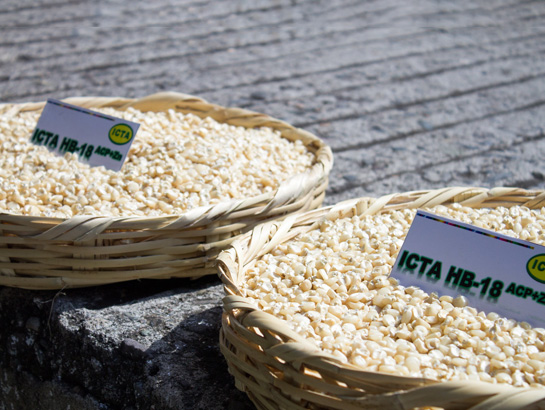Since 2016, an alliance led by Institute for Agricultural Science and Technology (ICTA) and strengthened by ATESCATEL’s innovative management has promoted the production and sale of seeds of biofortified crops in the Guatemalan dry corridor. Its impact reaches more than 5 million people.
Guatemala has the highest rate of chronic malnutrition in Latin America. More than 32 percent of Guatemalan children under 5 years of age are affected by hidden hunger due to diets deficient in micronutrients such as iron, zinc, and provitamin A. These deficiencies cause stunting, poor cognitive development, and blindness.
Although Guatemalans can obtain these essential nutrients from white corn and black beans, since 2015 the area that produces these basic grains in Guatemala has been affected by recurrent droughts caused by climate change. Currently, about 37 percent of the population of this region, called the dry corridor for the frequency of its cyclical droughts, suffers from severe or moderate food insecurity.
To enrich family diets, the ICTA developed, tested, and released biofortified varieties of beans, corn and hybrid corn. In turn, with training and support from the BioFORT Platform and HarvestPlus, starting in 2016, ATESCATEL developed a model of vertical integration of conventional and biofortified seed chains, from production to sale. The alliance faced technological and cultural challenges to develop, produce, and disseminate biofortified seeds.
The ICTA implemented the biofortification of corn and beans with the support of HarvestPlus, which helped obtain genetic material from nutrient-dense varieties. The Institute evaluated and selected materials for their adaptation to the environment and agronomic performance. Later, some varieties were sent to test plots in the fields of farmers who managed the new crops using traditional technology. The researchers also conducted sensory acceptability studies among farmers’ families. After a process that took several years, the new varieties were registered and released to the market.
The team held field days with producers and consumers and distributed materials to promote the crops. ATESCATEL participated in the initiative from the first evaluations of the new biofortified varieties in associated fields. After receiving training, the cooperative revolutionized its management model and began to produce the new seeds, diversifying its portfolio.
“With these varieties, our children eat the usual serving of beans and a tortilla, but the nutritional content is higher,” said Karina Hernández, a farmer in Guatemala.
The direct beneficiaries are estimated at more than 14,000, while indirect beneficiaries include 340,750 low-income women at risk of anemia.
According to HarvestPlus, a tortilla (bread substitute) made with ICTA HB-18ACP + Zinc corn has twice as much zinc as one made with conventional grain. The ICTA B-15ACP + Zinc corn also provides 90 percent of the proteins contained in milk, while conventional corn provides only 40 percent.
The proportion of sales of biofortified seeds is increasing in ATESCATEL’s portfolio, an expansion that has translated into greater adoption by small-scale farmers in the region. The cooperative has enjoyed significant financial improvement ever since it diversified its portfolio.
Between 2016 and 2019, 20 members of the Cooperative produced a total of 39.8 tons of corn seed and 45.6 tons of biofortified beans, of which 84 percent to 93 percent were placed in the market and the rest were used for promotional activities.
BioFORT Platform: the backbone in promoting nutrition to vulnerable Guatemalans
Led by ICTA and supported by HarvestPlus, the BioFORT Platform is a multisectoral endeavor that coordinates research, development and promotion of biofortified crops to improve nutrition in Guatemala, a nation affected by high rates of hidden hunger.
Created in 2015, this alliance is made up of government institutions, non-governmental organizations, universities, seed producers, and civil society, and it coordinates research and development efforts to promote the production and consumption of biofortified crops. Its objective is to strengthen the nutritional status of the Guatemalan population.
With the help of HarvestPlus, Guatemala obtained the basic genetic materials of corn, beans, and sweet potatoes. BioFORT conducted field trials and implemented the release of biofortified crops. To encourage adoption by farmers, BioFORT selected the improved crops according to their adaptability and productivity relative to traditional varieties. The alliance also carried out product measurements to ensure, among other advantages, suitable grain size, pleasant flavor, and short cooking time. Only then were the biofortified seeds released, legally registered for potential commercial use, and, once multiplied, offered to producers. The alliance launched a technology transfer and training plan to help families adopt these crops.
Within two years after the release of the biofortified varieties, the beneficiary population was surveyed to estimate indices of agronomic performance and acceptability.
“With these seeds we help improve children’s nutrition. That is why we promote them among our partners,” said Marta Rivera Duque from ATESCATEL.
In four years, BioFORT has tackled malnutrition in 15 of the 22 departments of Guatemala. The platform has directly benefited more than 88,000 farmers and indirectly more than half a million family members who consume beans, corn and sweet potatoes biofortified with iron, zinc and provitamin A. The production tonnage and the cultivated area have grown steadily since the platform’s inception.
The platform has conducted extensive acceptability studies of biofortified crops. A tamalito (sweet bread cake) prepared with biofortified corn contains 4 times more zinc than one made with the conventional variety. A biofortified tortilla (bread substitute) has 63 percent more zinc, and a glass of atol (a favorite drink among children), 78 percent more.
